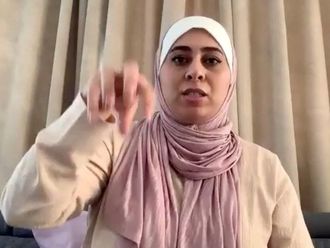Baghdad: Politicians, both Sunnis and Kurds, are avoiding any optimistic remark because of the fundamental differences among various political factions on ratification of the Iraqi constitution, despite enthusiasm from Shiite politicians over an agreement on the constitutional amendments.
Iraqi resistance factions demand a full review of the Iraqi permanent constitution before joining the current political process. This means that the process of drafting the constitution will restart from scratch.
The constitution amendments committee of the Iraqi parliament will ask the President to resolve differences ahead of the process of reaching an agreement on ratification of constitution.
Autonomous regions
Hamid Mualla, a leading figure in the Islamic Supreme Council led by Abdul Aziz Al Hakim, told Gulf News: "The Sunni Accord Front is no longer opposed to establishing autonomous regions [but] seeks to limit the territorial government power and grant the central government in Baghdad considerable control. The topic is rejected by Shiites and Kurds.
"The Sunni Accord Front also wants to delete some sentences from the constitution like religious authority in Najaf and the Baath Party, besides seeking a law on sharing of the current and future wealth, especially Iraq's oil revenues, unlike Shiites and Kurds who insist on limiting it to the newly discovered wealth."
Abbas Al Bayati, a member of the constitution amendments committee, said that it will take around 60 days to forge agreements among the political blocs and resolve differences.
Kamal Nour Shirwan, an independent Kurd politician, told Gulf News: "Despite the Shiite-Sunni conflict, the two parties agreed to postpone implementation of Article 140 of the constitution related to normalising the situation in the disputed province of Kirkuk between Kurds, Arabs and Turkmen. Kurd leaders are threatening to withdraw from the government if the issue is delayed."
Kirkuk security
Massoud Barazani, Kurdish region President, had said postponing the implementation of Article 140 for three or four months is acceptable.
Iraqi politicians hope that Kurdish, Sunni and Shiite political accordance will improve the political and security situations, including halting the continuous sectarian violence especially in Baghdad.
Abdul Hussain Sari, a Political Science professor, told Gulf News: "Iraq is on the verge of a security explosion and a flammable civil war between participants in the government, especially if differences on the three core issues - federal regions, wealth and Kirkuk - were unresolved.
"I believe that the Kurdish-Shiite-Sunni political conflict is based on their desire to draft constitution articles that meet their interests and desire to keep long-term control. It is more serious than the threat posed by terrorist groups like Al Qaida to Iraqi unity."











